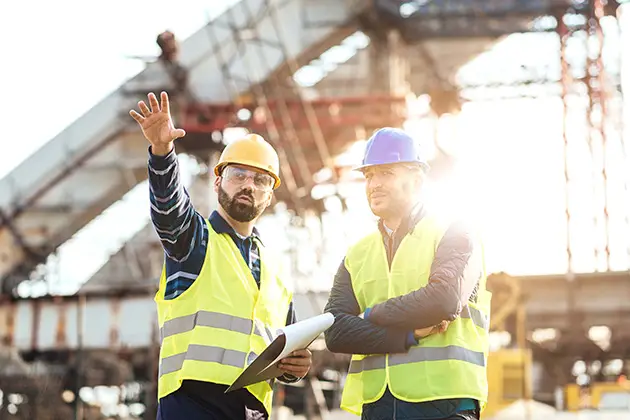Artificial intelligence (AI) is rapidly transforming the construction industry, offering innovative solutions and tools that have a significant impact on the way construction projects are planned, executed, and managed. The growing importance of AI in construction can be attributed to its potential to address various industry challenges, improve efficiency, safety, and sustainability, and create new opportunities for businesses and professionals. This article will delve into the many aspects of AI’s importance in the construction sector, exploring the following topics:
Addressing industry challenges
Enhancing safety and risk management
Boosting productivity and efficiency
Supporting sustainable construction practices
Facilitating collaboration and communication
Improving quality control and defect detection
Streamlining project management and decision-making
Enabling predictive maintenance and facility management
Promoting skill development and workforce augmentation
Driving innovation and new business opportunities
Addressing industry challenges
The construction industry faces several challenges, such as labor shortages, cost overruns, project delays, and increasing demands for sustainability and innovation. AI can help address these challenges by automating repetitive tasks, optimizing resource allocation, and providing data-driven insights that enable better decision-making. By tackling these issues, AI can help construction companies maintain competitiveness and meet the evolving needs of their clients and stakeholders.
Enhancing safety and risk management
Construction sites can be hazardous, and ensuring worker safety is a top priority for the industry. AI-powered tools, such as computer vision systems and wearable devices, can monitor worksites in real-time, identifying potential hazards and unsafe behaviors. By alerting supervisors and workers to potential dangers, AI systems can help prevent accidents and injuries, thereby reducing the risks associated with construction work.
Boosting productivity and efficiency
AI has the potential to significantly improve productivity and efficiency in the construction industry. By automating repetitive tasks, optimizing resource allocation, and facilitating data-driven decision-making, AI can streamline construction processes and reduce project timelines. AI-powered construction robots can handle tasks such as bricklaying, welding, and painting with greater speed and precision than human workers, increasing productivity and lowering labor costs.
Supporting sustainable construction practices
Sustainability is a critical concern in the construction industry, and AI can play a significant role in promoting environmentally friendly practices. AI-driven design tools can optimize building designs for energy efficiency, reducing the environmental impact of construction projects. Additionally, AI-powered resource optimization and waste reduction strategies can minimize the consumption of materials and energy throughout the construction process, contributing to a more sustainable industry.
Facilitating collaboration and communication
Effective collaboration and communication are essential for the successful completion of construction projects. AI-powered collaboration tools can facilitate real-time communication between construction stakeholders, such as architects, engineers, contractors, and owners. These tools can automatically track project progress, flag issues, and enable efficient communication, ensuring that all parties stay informed and aligned throughout the construction process.
Improving quality control and defect detection
AI-driven quality control systems can identify defects and deviations from design specifications early in the construction process, ensuring that issues are addressed before they become costly problems. By analyzing data from various sources, such as images, sensor readings, and inspection reports, AI systems can detect anomalies and recommend corrective actions, improving the overall quality of construction projects.
Streamlining project management and decision-making
AI-powered project management tools can enhance the planning and execution of construction projects by providing data-driven insights and recommendations. These tools can analyze historical data to identify trends, allowing for more informed decision-making and reducing the likelihood of costly delays or resource overruns. By automating and optimizing various project management tasks, AI can help construction professionals deliver projects on time and within budget.
Enabling predictive maintenance and facility management
AI can significantly improve facility management and maintenance processes by analyzing data from building systems and sensors to predict when equipment is likely to fail or require maintenance. This enables building managers to perform maintenance proactively, preventing costly downtime and extending the life of building systems. Moreover, AI-driven energy management systems can optimize the performance of heating, ventilation, and air conditioning (HVAC) systems, lighting, and other building systems, resulting in reduced energy consumption and lower operating costs.
Promoting skill development and workforce augmentation
AI can support the development of construction professionals by providing personalized training and skill development resources. AI-powered learning platforms can analyze individual strengths and weaknesses, creating tailored learning paths to help construction workers acquire new skills and improve their existing ones. Additionally, AI-driven virtual and augmented reality tools can simulate real-world construction scenarios, enabling workers to practice and refine their skills in a safe and controlled environment.
AI can also augment the human workforce by assisting with complex tasks and decision-making processes. AI systems can provide valuable insights, recommendations, and support to construction professionals, enhancing their capabilities and enabling them to work more effectively. By leveraging the complementary strengths of humans and AI, construction projects can benefit from improved accuracy, efficiency, and innovation.
Driving innovation and new business opportunities
The integration of AI into construction processes is opening up new business models and opportunities for construction companies and professionals. For instance, AI-driven design and engineering services can enable architects and engineers to offer more innovative and sustainable building solutions. Similarly, construction companies can differentiate themselves by leveraging AI-powered tools and technologies to deliver faster, more cost-effective, and higher-quality projects.
Additionally, AI can help construction companies unlock new revenue streams by offering value-added services such as predictive maintenance, energy management, and smart facility management. These services can generate ongoing revenue for construction companies while providing tangible benefits to building owners and occupants.
In conclusion, AI is becoming increasingly important in the construction industry due to its potential to address various challenges, improve efficiency, safety, and sustainability, and create new opportunities for businesses and professionals. By embracing AI and harnessing its potential, construction professionals can stay ahead of the competition and deliver better results for their clients and stakeholders. As AI continues to advance, it will play an increasingly critical role in shaping the future of construction, offering new possibilities for cost savings, efficiency improvements, and innovation.







